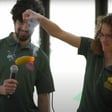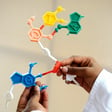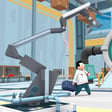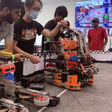Become a Creator today!Start creating today - Share your story with the world!
Start for free
00:00:00
00:00:01

Teaching Science in Prison
Science education occurs in juvenile detention centers, as part of the schooling available to young people there so that they can receive their high school equivalency certification. Guests Rachel and Kasina talk about their experiences teaching science and other subjects to boys and young men in these institutions. They describe the constraints and opportunities in these classrooms and how they compare to schools on the outside.
Related to this episode:
• Dialectical behavioral therapy (DBT): https://behavioraltech.org/resources/faqs/dialectical-behavior-therapy-dbt/
• Cognitive behavioral therapy (CBT): https://psychcentral.com/lib/in-depth-cognitive-behavioral-therapy/
• High School Equivalency (HSE): https://hiset.ets.org/what
• GED high school equivalency test: https://ged.com/
• Massachusetts educational standards: http://www.doe.mass.edu/frameworks/
• Common Core: http://www.corestandards.org/
• “Why is Pluto no longer a planet?” Article from BBC: https://www.bbc.com/news/science-environment-33462184
• Tool for calculating solar system scale models from the Exploratorium: http://www.exploratorium.edu/ronh/solar_system/
• Khan Academy: https://www.khanacademy.org/
• AISD stands for Austin Independent School District
• The cover art for this episode alludes to the activity mentioned where a class forms a scale model of the solar system with the sun as a basketball.
Our closing music is “Yes And” by Steve Combs, used under a Creative Commons Attribution License: https://creativecommons.org/licenses/by/4.0/
Subscribe and find more podcast information at: http://www.k12engineering.net. Support Pios Labs with regular donations on Patreon: https://www.patreon.com/pioslabs, or send one-time contributions by buying us coffee: https://ko-fi.com/pioslabs. Thanks to our donors and listeners for making the show possible. The K12 Engineering Education Podcast is a production of Pios Labs: http://www.pioslabs.com.



















